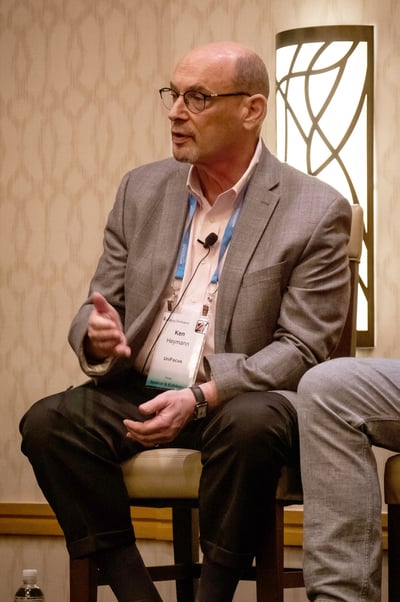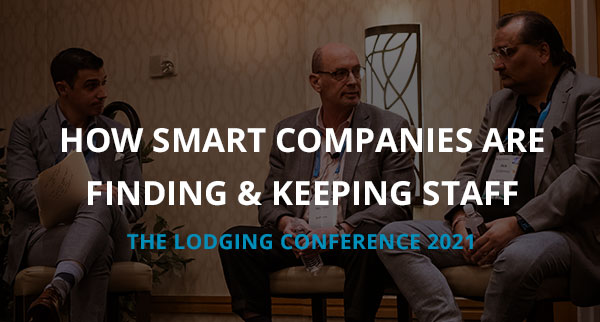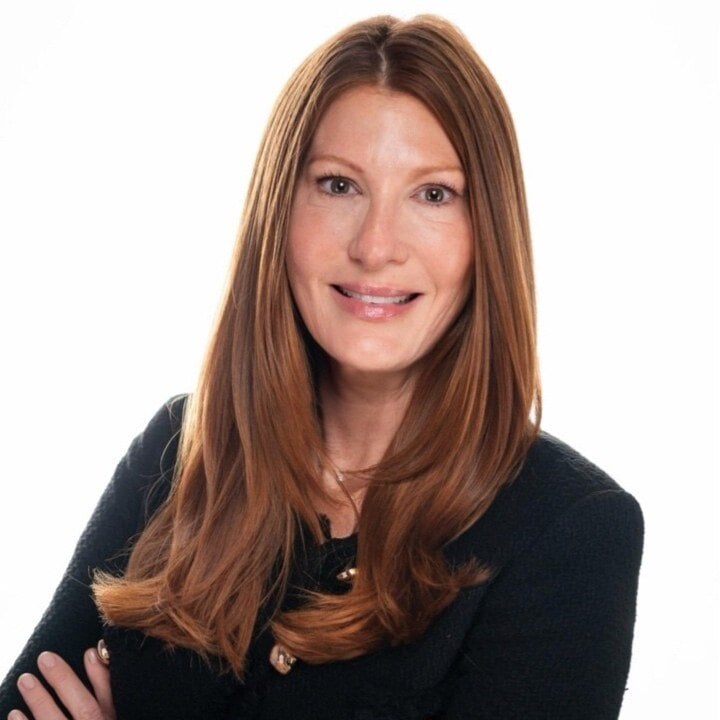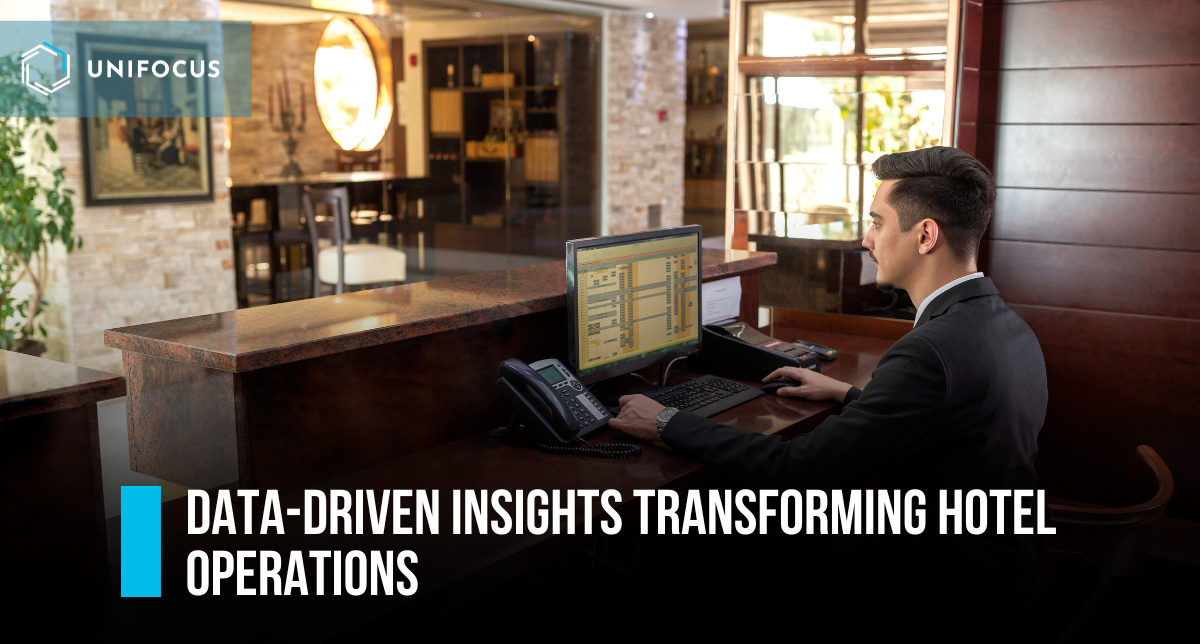The employees are in charge. Rick Tomljenovic, COO, Tristar Hotel Group
Whether it was the focus of the panels or talks or not, the discussions on stage, in the halls, and at dinner centered around a few main themes:
- Attracting and retaining talent, beyond wages
- Leveraging technology, internal and guest-facing
- What the data is telling us about the recovery, by market and traveler
Here are our key takeaways, some of our favorite quotes, and strategic ideas within each of these threads.
Attracting and retaining talent goes beyond wages
Labor is a theme we heard over and over (and over), in nearly every session. UniFocus COO Ken Heymann, who spoke on the panel about finding and retaining staff, delivered some actionable strategies, both in the session and in a blog on the same topic Rethinking Hospitality's Approach to Attracting and Maintaining a Loyal Workforce.
The “labor crisis” isn’t a new problem
In Europe, hospitality is a profession. In the US, we consider it a side job. Rick Tomljenovic, COO, Tristar Hotel Group
In the Positions Available! How Smart Companies are Finding and Keeping Staff panel, we heard again the many ways that the current labor crisis is not a pandemic problem, but a pre-existing problem that the pandemic illuminated.
The panel agreed that the industry, as a whole, falls short on marketing to employees the way it would customers, filling the talent pipeline early, getting creative with employee benefits that matter, and approaching the whole situation with empathy.
There are enormously appealing aspects to the industry that we don’t talk about enough

There aren’t that many industries where by the time you’re 30, you’re running a multi-million-dollar business. Ken Heymann
Panel moderator CJ Arlotta kicked off the discussion with a question that we often fall short of asking, “why are you in this industry?” Are we asking this question often enough of ourselves and our teams? If not, we’re doing a disservice to them and the business.
Here are a few thoughts related to how we can better sell the industry:
- There are opportunities to advance throughout the industry – how many stories have we heard of people going from dishwashers to CEO or front desk to GM? However, when presenting career paths, it’s important to consider what employees aspire to (the idea of running a multi-million-dollar business) compared to what they are seeing in front of them (a GM working every shift, doing 10 jobs, etc.).
- International opportunities can be appealing – consider how much Instagram has done for travel and appealing to budding influencers; how can the hospitality industry better showcase international opportunities to potential talent?
- While there’s a career path, there doesn’t have to be – how many established professionals across all industries have hospitality somewhere along their resume?
- There are a LOT of ways to work in the industry – not everyone who works in a hotel ends up being a GM, but their experience can be used in the industry from design to press to law and more.
It’s not just wages – we have to look at alternative satisfiers
The labor crisis is not a wage issue. It's a flexibility issue. Rachael Rothman, CFA, Head of Hotels Research & Data Analytics, CBRE
We have seen hiring bonuses and wage hikes, but they aren’t working to meaningfully attract and retain workers. We have to ask ourselves, what are some approaches to wage that aren’t just increasing it? And what are other ways we can be creative when it comes to providing benefits that matter to employees?
- On-demand pay (aka instant pay or early wage access) is a benefit that employers can offer employees for no cost, but makes a big difference in helping employees manage their finances.
- Flexible scheduling is the hallmark of the gig economy, why can’t we learn from it and incorporate these approaches in hospitality? If you have the tools to do it (like ShiftGenius), you can give employees the flexibility they need while also ensuring your business needs are covered.
- Predictive scheduling approaches are a regulatory requirement for some areas, but there is nothing preventing operators from embracing the Fair Work Week framework to provide employees more advanced scheduling, and confidence in their hours.
Frederick J. DeMicco, Ph.D., RDN, Executive Director & Professor, School of Hotel and Restaurant Management, Northern Arizona University, offered up some ideas of how hoteliers can connect with the educational programs in their communities, and how it can go beyond just the hospitality programs. He proposed, when potentially partnering with a university, don’t just work with the hospitality program, why not look at other programs (like early childhood development where you could run a daycare in the property for guests and employees)?

Talent is a pipeline
The adage “help us grow or we will go” has never been more important. So, we need to remember that attracting and retaining talent is a long-term goal and talent is a pipeline. And we need to work on nurturing that pipeline from much earlier on, and at the community level.
What can operators do?
- We don’t teach trades in school anymore - look around you at the community level to hospitality and culinary high schools.
- Connect with nearby university programs to partner with for internships or other skills development.
- GMs don’t have the bandwidth to even interview people who are coming in, so it can feel easy to skimp on onboarding and training of the employees you are able to hire, especially in lower-level positions. Don’t. How many housekeepers are you losing in the first few weeks because it’s a tough job and they haven’t been trained or don’t ever see their managers?
- Ensure you are identifying retention opportunities by specific roles. Roles that used to have high turnover are only turning over faster – each role needs its own strategy.
Leveraging technology, internal and guest-facing
You can't configure a spreadsheet to accommodate work rules. Michael Blake, SVP & CTO, American Hotel & Lodging Association (AHLA)
Smart tools are key to helping managers reclaim their time and focus it on what matters – guest and employee engagement. Technology was the second main theme of the event. From the technology we use to run operations to how it can supplement the workforce you already have to the how, when, and why (or why not) of incorporating guest-facing technology into the business.
In the Capitalizing on Tech session, panelists made great points about how the industry can leverage technology, reduce fear, and plan ahead for investment in technology.
Here are some overarching tips from the group when approaching tech investments:
- Start a technology reserve that you can use when a new technology comes up instead of trying to find money when you want something. (Neal Patel, 2021-2022 Vice Chair, AAHOA; Managing Partner, Blue Chip Hotels )
- It's better to focus not just on how the technology solves the problem, but also what it's like to work with the company. That's where the rubber meets the road. (Branigan Mulcahy, Co-Founder, Virdee, Inc.)
- Leverage what you’ve already got first and maximize what you have before you go out and get something new (what % of capabilities of your software are you actually using and how can you expand your actual usage with the providers you have). (Michael Blake)
- When you put all your eggs in one basket, it gets really tough to move those eggs [and the basket knows it]. (Greg Adams, Sr. Vice President & Chief Digital Officer, Best Western® Hotels & Resorts)
Using technology to augment the workforce you have
I’d rather have GMs focus on the customer. The ROI on customer satisfaction is so much more than the cost of the technology. Neal Patel
Incorporating technology into your business is worth the investment. Especially in a fight for labor, how can you both ensure your business needs are met and make things easier for employees?
We need to look outside the industry to the people who have solved for the issues we face, in a way that lifts the burden off of our workforce. As an example, Uber and Lyft have solved the identity verification issue (think about how many drivers they get on their platform without a dedicated person checking IDs) - is this a task we can take off the front-line employee’s plate by incorporating technology?
Guest-facing technology is a reality for the industry, accelerated by COVID
Guests are walking in the door with highly advanced pieces of technology. Why not use it? Greg Adams
While surely there is fear of change and implementing technology, the focus needs to be on what’s the right thing to invest in? The room collectively lamented as the panel talked about how much money was invested in iPod clock radios ($150 per room to be obsolete how fast??).
Here are some thoughts on how to incorporate guest-facing technology the right way:
- What's the con in contactless? It's that it's new. COVID has accelerated a lot of these things, but also gotten customers used to it. How many of us thought QR codes had finally died their slow death years ago only to make a huge comeback and everyone knows how to use them!
- How fast can you implement and update? If you’re a large, branded property by the time the last hotel has implemented a technology, it's obsolete. That doesn’t mean you skip it, it means you work with partners who can get you up faster and keep you up to date.
- If something breaks, now what? When implementing technology, it's important to consider who is on the ground using it and supporting it.
Are “hospitality” and technology adversaries?
What is hospitality, really? It means giving people what they want, meeting a guest where they want to be met. Some people want to check in on their phones. Some people want to check in on their computers. There are ways to repurpose staff.
“For some of us, that IS hospitality. Treat people they want to be treated.” Michael Blake
Greg Adams suggested looking at the customer journey and asking at each specific point, what are they trying to do? “When they want to deal with an individual, let them. When they don't, don't make them.” Think about when people get frustrated with technology, it's because we have to look at where in the customer journey they are.
Different markets are coming back at different rates
Secondary and tertiary markets are winning. And I don’t see that changing. Chicago and New York are hurting because they need international travel to come back. Dorothy Dowling, SVP & Chief Marketing Officer, Best Western® Hotels & Resorts
If you are considering when your property is going to see volumes return, the data say that it all depends on your location. Hotel Management did a great recap of the speed stats sessions on day 1, but we saw a lot of numbers at the conference.
What is the recovery looking like for different property types?
In the Up-to-the-Minute 2022 Forecasts session, the data demonstrated that hotels having success on the road to recovery are the ones that rely primarily on leisure segments. They also showed that a key divide in properties rebounding is whether the destination depends on air travel (which is why we're seeing Florida come back faster than Hawaii, as an example).
Which destinations are growing revpar fastest and slowest?
|
Fastest growing markets:
|
Slowest growing markets:
|
What are the operational takeaways from the data?
The outlook for operating efficiency is a mixed bag "post" COVID: Operating costs are cut to the bone but there is an opportunity to rethink policies, procedures, and standards.
- Limiting touchpoints + increased reliance on technology = reductions in staffing and service costs.
- F&B service has changed everywhere, whether it's curtailed, reduced, or reengineered.
- The data supports what we all know. Labor shortages are forcing hotels to place caps on occupancy outside of peak periods, limiting operations.
Business travel is slower to return, what can you do about it?
We need to be talking about the revenue risk of not getting out and getting face time with customers. The bottom line is that the salesperson who has to get out there and drive the bottom line and outcomes, it’s easier to do that in person. Dorothy Dowling
While it might be tempting to aim your marketing efforts at business travelers, it’s important to consider the messaging and whom you’re targeting.
Roger Dow, President & CEO, U.S. Travel Association, highlighted some very important points in getting business travel back, namely that it isn’t about tempting the business traveler back.
When it comes to business travel, the industry has a few things to overcome:
- The CFO who is looking back at the numbers and seeing that the company made money without travel.
- The general counsel who isn’t comfortable sending people on the road and introducing risk.
- The family of the traveler who wants to protect themselves.
By considering these obstacles to the return of business travel, you are likely to be more successful in your messaging.
Business travel and shows
It took more time than I expected to get comfortable being out and about again. We have to expect that people will feel that way. Elaine Simon, Senior Managing Editor, Hotel Management
There was a lot of discussion of which comes first, the lifted government mandate or the business traveler or trade show? Smaller meetings are going to have to come back first and let the bigger ones follow. Or for each company, business travel will come back after the first sale they lose to another company that did travel.
Trade shows can be especially tough in the current environment because vendors or suppliers will be there, but will buyers? And if the buyers aren't there, the vendor is going to reevaluate the investment.
The panel agreed that it is all about communication and transparency. Whether you are holding a large event and have mask or vaccine policies or you found out about an attendee contracting COVID during the event. The best we can do is communicate openly and honestly about policies (and how they may change) for an event. Because every event, location, municipality, company, and traveler is different.
Debbie Johnson, Executive Director, Arizona Office of Tourism, talked about the challenges of waiting for government direction in terms of mandates, especially as it's compounded by the travelers' needs and preferences. Ultimately, it's on the industry to make it work for travelers.
In response to looking for consistency across states and geographies, it’s tough because it depends on what the traveler wants. Some are traveling to a destination because there’s a mask mandate and then there are some who will NOT travel to a place without a mandate and some who only want to go where there isn’t a mandate. It’s our job to message in a way to support travelers.
The traveler is changing
Younger generations do not put up with some of the things that we’re used to putting up with [skipping vacation days and overworking themselves]. Dorothy Dowling
The good news (and the panel agreed) is that while travel is changing, it isn't going anywhere. If anything, the pandemic reignited a desire for travel in many. As Elaine Simon pointed out, "People are reflecting on how they are living their lives and making changes."
Think about the trajectory of RV sales and the alternative lodging market. There has been exponential growth in outdoor travel adjacent to public lands, which, as Debbie Johnson points out, "is something that we as an industry are going to have to advocate for in terms of protecting our public lands."
Consider these points from the panel about what we need to be thinking about as we continue to watch travel and the traveler change and evolve:- Upscale is challenged by service quality right now - with the labor situation where it is, service is suffering and amenities are limited, so how can you keep your guests from going somewhere else?
- As we work to build back, we need to focus on reinforcing confidence and comfort. (Debbie Johnson)
- The biggest change that has happened is acceleration in the digital marketplace. We can buy differently across all media platforms and customize. (Dorothy Dowling)
- When buying differently, you can then fold in your loyalty data where you know so much more about your guests to supplement your messaging.
- We can market and message appropriately based on what we need to do.
- The customer is leading us. The governance of each state and province is leading us. And we’ll follow their lead.
- What can we look to other than business travel? The sports market has incredible resiliency because as parents, we would do anything for our kids. This looks like leisure travel, but functions like business travel.
What does it all mean?
While it may seem like the conference was all about the challenges the hospitality industry is facing, the fact that it was held, in person, with such strong attendance was a positive sign. The challenges are not insurmountable and there are partners, like UniFocus, here to work with you as the industry emerges from this phase of the pandemic.
The UniFocus platform automates tasks so managers can reclaim their time, helps you become the employer of choice by offering meaningful benefits like early wage access and on flexible scheduling to employees, plan for the business you have and the business you want, execute with optimized operations and validate your progress through guest and employee survey solutions. ⬡

 15 Takeaways from the 2021 Lodging Conference" >
15 Takeaways from the 2021 Lodging Conference" >








